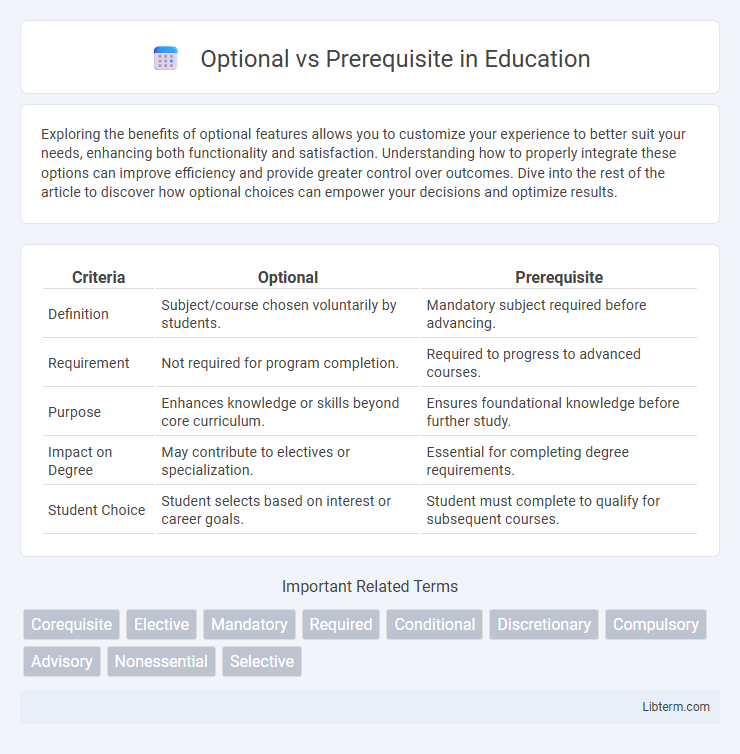Exploring the benefits of optional features allows you to customize your experience to better suit your needs, enhancing both functionality and satisfaction. Understanding how to properly integrate these options can improve efficiency and provide greater control over outcomes. Dive into the rest of the article to discover how optional choices can empower your decisions and optimize results.
Table of Comparison
| Criteria | Optional | Prerequisite |
|---|---|---|
| Definition | Subject/course chosen voluntarily by students. | Mandatory subject required before advancing. |
| Requirement | Not required for program completion. | Required to progress to advanced courses. |
| Purpose | Enhances knowledge or skills beyond core curriculum. | Ensures foundational knowledge before further study. |
| Impact on Degree | May contribute to electives or specialization. | Essential for completing degree requirements. |
| Student Choice | Student selects based on interest or career goals. | Student must complete to qualify for subsequent courses. |
Understanding Optional and Prerequisite: Key Definitions
Understanding optional and prerequisite concepts is essential in course planning and project management. An optional element refers to a component that may be selected but is not mandatory, allowing for flexibility and customization. In contrast, a prerequisite is a required condition or course that must be completed before advancing to a subsequent stage or module, ensuring foundational knowledge or skills are in place.
The Role of Optional Elements in Learning or Processes
Optional elements in learning or processes serve to enhance engagement and provide flexibility, allowing individuals to tailor their experiences to personal interests and needs. These components contribute to deeper understanding by encouraging exploration beyond mandatory requirements, fostering creativity and independent problem-solving skills. Incorporating optional tasks can improve motivation and adaptivity, positioning learners or participants to excel in diverse environments.
Importance of Prerequisites: Building the Foundation
Prerequisites establish essential foundational knowledge and skills critical for mastering advanced concepts, ensuring learners can progress confidently without gaps in understanding. Define clear prerequisite requirements to enhance course effectiveness and reduce dropout rates due to unpreparedness. Emphasizing prerequisites supports structured learning paths that optimize student success and competency development.
How to Identify Optional vs Prerequisite Components
To identify optional versus prerequisite components, analyze the dependency structure within the project or system. Prerequisite components must be completed or integrated before other parts can function properly, indicating a mandatory sequence. Optional components enhance functionality or user experience but do not block core processes if omitted, highlighting their non-essential status.
Benefits of Making Certain Steps Optional
Making certain steps optional in a process enhances user flexibility and accommodates diverse needs, improving overall satisfaction and completion rates. Optional steps reduce friction by allowing users to bypass non-essential tasks, speeding up workflows and increasing efficiency. This approach supports personalized experiences, enabling users to tailor their journey without compromising core requirements or outcomes.
Risks Associated with Skipping Prerequisite Steps
Skipping prerequisite steps can introduce significant risks such as incomplete knowledge, increased errors, and project delays due to missing foundational requirements. Without adhering to prerequisite tasks, teams may face integration failures and quality assurance issues that compromise overall outcomes. Ensuring prerequisite compliance mitigates these risks by establishing a solid framework for subsequent optional activities.
Scenarios Where Optional Choices Enhance Flexibility
Optional choices enhance flexibility by allowing individuals to tailor their learning paths according to their interests and career goals, unlike prerequisites which enforce a fixed sequence. In professional development scenarios, optional modules enable employees to acquire specialized skills without delaying overall progress. This adaptability fosters continuous learning and responsiveness to evolving industry demands.
When Prerequisites Become Barriers to Progress
Prerequisites can become barriers to progress when they impose rigid requirements that limit learner access, particularly in diverse educational or professional settings where foundational knowledge varies widely. Optional modules encourage flexible learning paths, allowing individuals to acquire skills based on personal needs and readiness, thus fostering inclusivity and continuous development. Balancing prerequisites with optional content supports skill mastery while minimizing obstacles to entry and advancement.
Balancing Optional and Prerequisite Elements for Success
Balancing optional and prerequisite elements in project management ensures flexibility while maintaining essential standards for success. Prerequisites set the foundation by defining mandatory criteria, whereas optional components allow adaptation and innovation without compromising core objectives. Strategic integration of both elements optimizes resource allocation and enhances overall project outcomes.
Decision-Making Tips: What Should Be Optional or Prerequisite?
Determining what should be optional versus prerequisite involves evaluating the core competencies and essential knowledge required for successful progression in a given field or course. Prerequisites are critical foundational skills or concepts that ensure a learner or participant is adequately prepared, while optional components provide flexibility and allow for personalized learning paths or enrichment opportunities. Decision-making should prioritize prerequisites that directly impact competency and outcomes, reserving optional elements for supplementary knowledge that enhances but does not hinder overall performance.
Optional Infographic

 libterm.com
libterm.com